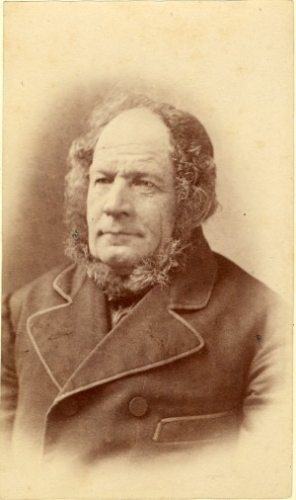
Gregor Nagele
When Gregor Nagele emigrated to the United States from Wittenberg, Germany, a young, bright-eyed, uneducated teenager, he came with a peculiar and valuable skill-commandeering cadavers. The medical students needed "subjects" on which to practice their surgical skills, and Gregor Nagele knew how to get them.
In those days, there was no law that allowed medical students or medical schools to collect bodies for educational purposes, so the cadavers had to be acquired surreptitiously. Whatever you call it-"body snatching," or "grave-robbing," or "prospecting (the term Nagele himself preferred), according to the obscure accounts-the "prospectors" were smart and did not put much detail in writing, and Mr. Nagele secured over two thousand cadavers during his janitorial half-century at U-M.
On a less ghoulish note, he also rang the hand-held bell-always on time-to let the students know when class was about to begin or had ended.
University of Michigan janitors (today known as "custodians") are often, unsung heroes, despite the importance of their roles as guardians and protectors of campus buildings. Mr. Nagele was well-loved, appreciated, and remembered-not so much for his warm smile or his thoroughness in cleaning bathrooms, but for his quick come-backs and risky business. He was sometimes hauled into court for the body-snatching-and-hiding activity, but always found a way to talk his-and the department's-way out of trouble.
Nagele earned the nickname of "Doc," by spending so much time cleaning and observing in the anatomical labs. As creepy as it sounds, a passage in his own obituary tells it all. It read, "It is said that if the knife point was placed at any point of the body he could tell exactly just what structures it would sever if it were pushed on through to the other side of the body."
It is in some ways sad that "Doc" Nagele was never able to officially become a doctor and wear the white coat worn by the students whose careers he helped to assure through his cadaver-hunting efforts. He was, until the end, the beloved man in a suit who rang the timely hand-held bell. Hopefully, it gave him some solace and pride when members of the medical faculty called Nagele one of the "best practiced anatomists in the country."
In his later years, a few of the Regents deemed Nagele "too old and too feeble" to do the work of a janitor, and tried to dismiss him. The medical faculty and students would not hear of it. In protest, they pretended not to hear the clock installed to replace Nagele's hand-held bell, and demanded that Nagele stay on as bell-ringer. The Regents agreed.
While his personal life remained a mystery (newspapers reported he was married twice; one reported he had a daughter, another that he had a son; another, that he had no children but took in, educated and raised an orphan), his role as janitor, bell ringer and unofficial anatomist are part of the fabric of the University of Michigan medical school's early beginnings.
"Doc" Nagele died at 79, making $10 per month as a pensioner. Medical Department Dean Victor Vaughn wrote after Nagele's passing, "He was kind-hearted, genial in manner, true to his duty [he missed only two days for a sprained ankle, and despite urging from students to do otherwise, rang the bell on time], and beloved by all who came in contact with him. Old students on returning to the University will miss his genial and quaint face and the old bell will be rung no more."
Medical students are still dissecting bodies to learn firsthand about human anatomy; however, Michigan's Anatomy Act of 1881 led to the modern practice of body donation (usually before their deaths or by families). Also, nowadays, annual memorial services are held to honor the cadaver-donors and families and their contribution.